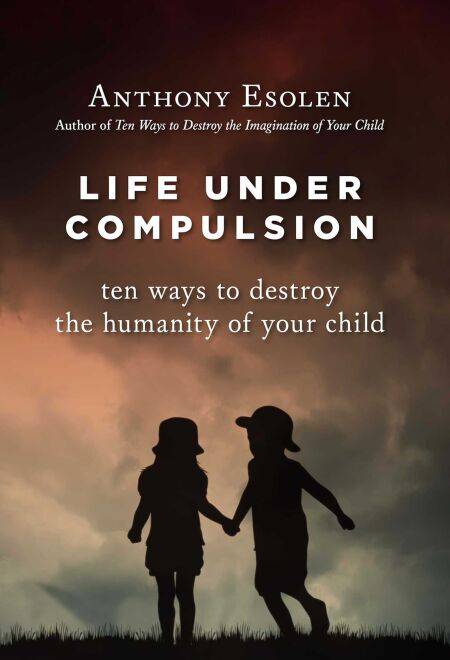
- Retrait gratuit dans votre magasin Club
- 7.000.000 titres dans notre catalogue
- Payer en toute sécurité
- Toujours un magasin près de chez vous
- Retrait gratuit dans votre magasin Club
- 7.000.0000 titres dans notre catalogue
- Payer en toute sécurité
- Toujours un magasin près de chez vous
Life Under Compulsion EBOOK
Ten Ways to Destroy the Humanity of Your Child
Anthony Esolen
Ebook | Anglais
16,76 €
+ 16 points
Format
Description
Welcome to Life Under Compulsion
How do you raise a child who can sit with a good book and read? Who is moved by beauty? Who doesn't have to buy the latest this or that vanity? Who is not bound to the instant urge, wherever it may be found?
As a parent, you've probably asked these questions. And now Anthony Esolen provides the answers in this wise new book, the eagerly anticipated follow-up to his acclaimed Ten Ways to Destroy the Imagination of Your Child.
Although freedom has become a byword of our age, Esolen reveals that our children are anything but free. In fact, they are becoming slaves to compulsions. Some compulsions come from without: government mandates that determine what children are taught, how they are taught, and even what they can eat in school. Others come from within: the itches that must be scratched, the passions by which children (like the rest of us) can be mastered.
Common Core, smartphones, video games, sex ed, travel teams, Twitter, politicians, popular music, advertising, a world with more genders than there are flavors of ice cream—these and many other aspects of contemporary life come under Esolen's sweeping gaze in Life Under Compulsion.
This elegantly written book restores lost wisdom about education, parenting, literature, music, art, philosophy, and leisure. Esolen shows why the common understanding of freedom—as a permission slip to do as you please—is narrow, misleading . . . and dangerous. He draws on great thinkers of the Western tradition, from Aristotle and Cicero to Dante and Shakespeare to John Adams and C. S. Lewis, to remind us what human freedom truly means.
Life Under Compulsion also restates the importance of concepts so often dismissed today: truth, beauty, goodness, love, faith, and virtue. But above all else, it reminds us of a fundamental truth: that a child is a human being.
Countercultural in the best sense of the term, Life Under Compulsion is an indispensable guide for any parent who wants to help a child remove the shackles and enjoy a truly free, and full, life.
How do you raise a child who can sit with a good book and read? Who is moved by beauty? Who doesn't have to buy the latest this or that vanity? Who is not bound to the instant urge, wherever it may be found?
As a parent, you've probably asked these questions. And now Anthony Esolen provides the answers in this wise new book, the eagerly anticipated follow-up to his acclaimed Ten Ways to Destroy the Imagination of Your Child.
Although freedom has become a byword of our age, Esolen reveals that our children are anything but free. In fact, they are becoming slaves to compulsions. Some compulsions come from without: government mandates that determine what children are taught, how they are taught, and even what they can eat in school. Others come from within: the itches that must be scratched, the passions by which children (like the rest of us) can be mastered.
Common Core, smartphones, video games, sex ed, travel teams, Twitter, politicians, popular music, advertising, a world with more genders than there are flavors of ice cream—these and many other aspects of contemporary life come under Esolen's sweeping gaze in Life Under Compulsion.
This elegantly written book restores lost wisdom about education, parenting, literature, music, art, philosophy, and leisure. Esolen shows why the common understanding of freedom—as a permission slip to do as you please—is narrow, misleading . . . and dangerous. He draws on great thinkers of the Western tradition, from Aristotle and Cicero to Dante and Shakespeare to John Adams and C. S. Lewis, to remind us what human freedom truly means.
Life Under Compulsion also restates the importance of concepts so often dismissed today: truth, beauty, goodness, love, faith, and virtue. But above all else, it reminds us of a fundamental truth: that a child is a human being.
Countercultural in the best sense of the term, Life Under Compulsion is an indispensable guide for any parent who wants to help a child remove the shackles and enjoy a truly free, and full, life.
Spécifications
Parties prenantes
- Auteur(s) :
- Editeur:
Contenu
- Nombre de pages :
- 224
- Langue:
- Anglais
Caractéristiques
- EAN:
- 9781684516278
- Date de parution :
- 10-07-23
- Format:
- Ebook
- Protection digitale:
- Adobe DRM
- Format numérique:
- ePub

Les avis
Nous publions uniquement les avis qui respectent les conditions requises. Consultez nos conditions pour les avis.






